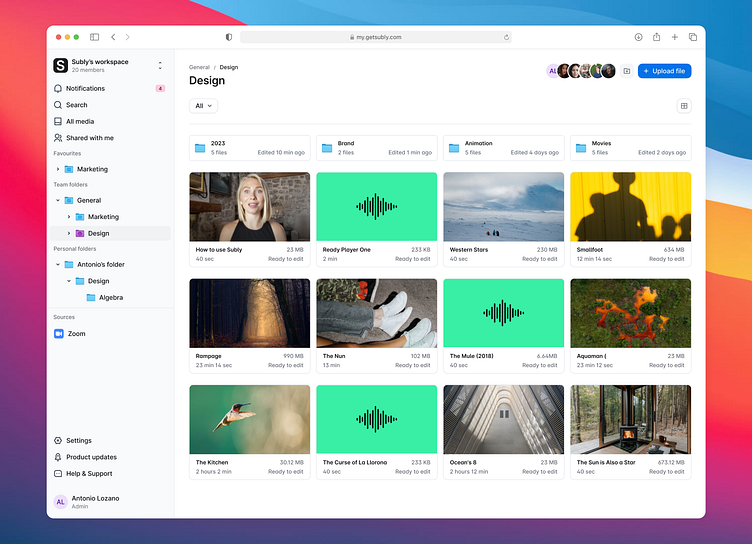Subly - File Management (Enterprise)
Introduction
Subly is a media accessibility platform that simplifies adding subtitles, captions, and translations to media. This case study details our strategic pivot from a B2C to a B2B model, focusing on enterprise clients to improve retention and reduce churn.
Subly initially served a B2C market dominated by content creators, making up over 90% of our customer base. However, due to high competition and churn rates, this model limited sustainable growth. We needed a pivot toward enterprise clients to ensure long-term viability and improve revenue stability.
My role
As the Senior Product Designer and Head of Product, I led the pivot, working end-to-end on product strategy, feature design, and market repositioning. I collaborated with the CEO, sales, and development teams to create a sustainable B2B model, overseeing everything from ideation to launch.
Challenge
Goals
Discovery
To better understand enterprise needs, we carried out user research through interviews with current clients, potential enterprise users, and stakeholders. This helped us identify key gaps between Subly’s current features and what enterprises were actually looking for.
Findings
Product vision
Who are we designing for?
OKRs
Successfully transition Subly’s target audience from B2C to B2B, meeting enterprise standards and increasing platform stability.
Solution and Designs
To address enterprise clients’ needs for security and workflow efficiency, we implemented two key features, which were exclusively available in a new pricing plan called "Enterprise.
File Management System: We developed an organized file management system that allowed teams to store, manage, and categorize files in a structured hierarchy. This made it easy for teams to locate and process files for various projects, improving overall efficiency.
Role-Based Access Control: Based on our findings, we introduced a new “Manager” role to enhance security and control. Managers could assign folder access to specific team members, ensuring that sensitive files were only visible to authorized users. This streamlined collaboration while maintaining necessary privacy and compliance standards.
Permissions
Create a restricted-access team folder
Manage members and customize access permissions
Move media
Folder settings
Outcome
Churn Rate: Reduced from 10.5% to 3%.
Customer Lifetime Value: Increased by 220%, showcasing stronger long-term client relationships.
Revenue Growth: The introduction of the Enterprise plan contributed a notable increase in ARR within the first two months.
Engagement: File upload metrics increased by 23%, leading to higher credit consumption on the platform and generating additional revenue per user.
Key Learnings
Shifting to B2B Is a Big Leap: Making a move from B2C to B2B meant aligning our teams and really understanding what enterprises needed. It wasn’t just about new features—it was about changing our entire approach.
Quick Feedback Pays Off: Talking to users and sales regularly helped us pivot and tweak our plans fast.
Keep Permissions Simple: Adding the “Manager” role struck the right balance between control and usability.
Markets Are Different: B2C and B2B have their own playbooks. B2B took more time and effort but brought stability and higher revenue.
Thorough Testing Matters: The seamless file migration reminded us that careful planning and testing make a difference.





























